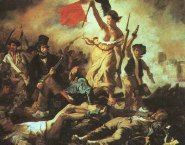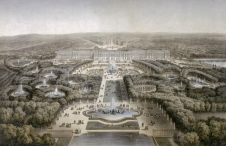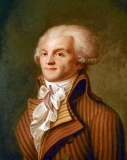For this lecture, read Rousseau’s Discourse on the Origin of Inequality, 1st part.

Jean-Jacques Rousseau (1712-1778) was influenced by many of the thinkers we have covered, including the Confucians, and was also an influence on many of the thinkers we have yet to read, including Hegel, Nietzsche, Paine, Marx, Engels and Bakunin. He was particularly concerned with being on the side of individual liberty checking the powers of sovereignty with Locke. Unlike Hobbes but somewhat like Locke’s idea of the blank slate, Rousseau imagined that the state of nature was innocent and pure and that it was society that corrupted the purity of the individual. This is more like Mencius than Xunzi, but both Confucians would praise society rather than see it as a source of corruption. Like Locke, Rousseau was a major influence on the American as well as French revolutions, our topics for next week. I gave you selections from his two most famous political works, the Discourse on the Origin of Inequality and On the Social Contract.

Rousseau was born in Geneva which, like Machiavelli’s Florence, was governed as a democracy, a minority of the male property owning class having voting power. He wandered Italy and France for a time as a secretary and tutor to aristocrats. In 1749 he saw an advertisement by the Academy of Dijon in a newspaper which asked for essay submissions in response to the question, “Has the rebirth of the sciences and arts contributed to the improvement or the corruption of manners?”. Rousseau experienced an awakening, and decided that original human nature is innocent and pure and that society has brought about corruption and ignorance.

This was in complete disagreement with many of his contemporaries, including his close friend Diderot and Voltaire, who were passionate champions of the Enlightenment and science and believed that the human mind was being freed from primitive superstitions by the progress of society. Diderot read Rousseau’s Discourse on the Origin of Inequality, and wrote to Rousseau, “never was so much intelligence used to make us stupid…while reading it, one longs to go on all fours”. Rousseau argued that society would ultimately destroy all that was good about humanity.

Society makes us artificial, corrupt, hypocritical and teaches us to wear masks (much like those worn to aristocratic parties at the time). Remember that Hobbes argued society was an artificial construction, but Hobbes believed that human beings were naturally selfish like Xunzi. Nietzsche would later take up this cynical turn against social progress and argue like Rousseau that society chains the individual. Nietzsche said that masks will inevitably grow on you and the others around you, and we must somehow learn to live with them. When we study colonialism and racism, we will look at Fanon and his book Black Skin, White Masks, one of the first books to deal directly with racism and what it means for black individuals trying to fit into white society.

Unlike Locke, Rousseau argued that property and the excesses of luxury as evil and destructive to our natural being. Rousseau, against Locke and Hobbes, praises the “savage” peoples, using his famous phrase, “the noble savage” and argued that “primitive” people live a more authentic and peaceful existence than “civilized” people. Like Hobbes and Locke, Rousseau believed that human individuals are equal in the state of nature, but argued that the social contract harms rather than enriches our original equality. Like Locke, Rousseau believed that humans are a blank slate, but human nature continues to be free and changeable, determined by the situation and society in which we live. Rousseau avoided arguing about natural laws (key for Hobbes and Locke), preferring human nature as an undefined freedom.

While Hobbes believed that the state of nature was brutal, Rousseau saw the state of nature as a peaceful and simple time. Society came about through domination and inequality, not as a social agreement of equals (much as Marx and Nietzsche argue later). Some came to have more than others, and the social contract legitimated these differences (note that Locke argued the same, but saw the accumulation of property as a positive thing). Thus, property is the root cause of social problems because it disrupts the natural equality of humanity. Later we will hear from Foucault, influenced by Rousseau, Nietzsche and Marx that institutions use binary terms such as master/servant, civilized/savage, and sane/insane to maintain divisions of power and inequality through privilege and marginalization.

Rousseau argues that while we live in society and enjoy its conveniences, we must resist the urge to give up our freedom, our most basic human nature. Because human nature is free and changeable, society can turn us into machines and slaves. To resist this slavery, we must (like Locke argued) be able to overthrow unjust governments and break social contracts (unlike Hobbes who saw the contract as unbreakable). We must also (like Machiavelli and Locke argued) have checks on the power of the sovereign and society such that society preserves the natural freedom of humanity and does not replace it with restrictions and repression. Rousseau turns Hobbes’ sovereign on his head: Because the sovereign or government is, in fact, the will and hand of the people, it must be subject to the participation of the people to be authentic. The social contract is founded on mutual agreement, and so it must be maintained by mutual agreement.

Unfortunately this does not solve all of the problems of inequality in the theories of Hobbes. Rousseau replaces the sovereign with the general will, which is indeed democratic, but what about the individual or minority group that disagrees with the general will? Both Hobbes and Rousseau argue that those who disagree must be made to agree or they are outside society. Both argue that the individual must be subordinate to the collective for the good of everyone. Rousseau argues that the expression of the general will is a check that overrides the individual or minority who disagree with the majority. Rousseau does not precisely specify how the general will or government will refrain from dominating the dissenting individual.

Rousseau, unlike Marx, was afraid of revolutions because he saw them as domination of the powerless by the powerful and pointed out that they often have terrible consequences. Nevertheless, his ideas were important for both the American and French revolutions. Robespierre referred repeatedly to Rousseau while using the idea of general will to brutally eliminate his opposition during the aftermath of the French Revolution.

In The Social Contract, Rousseau begins famously by writing, “Man was born free, and everywhere he is in chains”. He goes on to consider the birth of the social contract and how it can be, if balanced properly, an aid to freedom as much as a restriction on it. He argues, like the Confucians, that the birth of society is in the family. The major difference is that the father dominates the children (and wife, unmentioned) but loves the children while the state dominates the individual but does not love the individual. Thus, the father encourages the freedom and life of the children out of love while the later relation of the social-contract state does not necessarily encourage the freedom of the individual.

If Hobbes is right, we are mere herds of cattle to be controlled by the state. If Aristotle is right, some are born superior to others and they should control the subordinates. Rousseau argues that society, like slavery, is not natural and came about by the force of the stronger. If we obey society because of force, then there is no reason for duty. He uses the example of a robber with a gun and argues that one is not bound by duty to tell the robber about hidden valuables. If the sovereign/state is given power by protecting the people, why should the people stand with the state when it persecutes them or needlessly seeks war? This is the major question one likely asks after reading Hobbes.

To renounce one’s liberty is to renounce one’s humanity. Any social contract which makes one side the absolute authority and the other the absolutely obedient contradicts itself such that it is meaningless. In so far as the master gives the slave no power, the slave has no duty to follow the master and follows the master merely by force. If it is not unjust for the master to chain or kill the slave, then it is not unjust for the slave to escape or kill the master when they can grab the gun or the whip. Rousseau mentions Balboa taking possession of the Pacific Ocean and South America from the natives for Spain. Rousseau does believe that the minority is subject to the majority, but this is only justified when the state protects individual freedoms. Otherwise, without such protections, there is no injustice when the minority refuses to participate in the state.

Like the American Revolution, the French Revolution (1789 – 1799) was a transition from monarchy to constitutional republic, heavily influenced by Locke and Rousseau and influenced by the American Revolution. Unlike the American Revolution, the republic eventually collapsed, France became a dictatorship under Napoleon and then became a republic again after many years and transition periods. In spite of this, historians recognize the French Revolution as one of the key transitions in modern political history. As mentioned, for Burke and other conservatives the French Revolution was a classic failure of liberalism. For Marxists, the French Revolution was an important antecedent to the Communist Revolution.

At the end of the 1700s, France was going through rough times. Wars with England had plunged the country into debt, including French participation in the American Revolution. Remember that the British war debt, from the same wars with France, was also a central cause of the American revolution when the British tried to collect from the colonists. France had lost many of its land claims in the Americas to the British, bringing in less revenue to cover the mounting debt. In addition, many years of bad weather and crops had brought famine and economic hard times, especially to the peasants in the countryside.

Just as King Charles did in the time of Hobbes and Locke, the French King Louis the 16th started the long process of the French Revolution, unknown to him at the time, by calling together a parliamentary assembly in 1789 for the purpose of collecting taxes. At the time, the peasants and lower class were bearing much of the burden of the taxes as there were many exemptions for the nobility and the clergy. Many on the left say that a similar situation exists in America today, but it is the wealthy and corporations that now get the exemptions. Several advisers argued that the exemptions for the nobility and clergy must be reduced as the peasants could not be taxed any more, especially in the harsh times of the day. In spite of this, the nobles and clergy who dominated parliament opposed this advice and so the king called the assembly to try to forge a new consensus amongst the Three Estates, the nobility, the clergy, and the populace or commons (communes in French).

The third estate, the commons and their representation, became outraged at the stalling and blocking of motions by the nobility and clergy. After many failed negotiations, the commons met together and declared themselves to be the National Assembly with full power to decide political matters that involved the common populace. Frightened by this radical move, the king closed the building where they were assembling, saying that carpenters had to make repairs and preparations for a royal function. Because of the bad weather, the commons reassembled in a nearby indoor tennis court and swore what was later called the Tennis Court Oath: they would continue to assemble until a workable constitution for France was established. Some of the clergy and nobility joined their assembly and cause, and support poured in from all areas of France, but the majority of the nobility, the clergy, and the military did not support the commons. After the king fired advisers who supported the assembly, the situation exploded and France was consumed by rebellion, rioting and looting.

The assembly proceeded to publish the Declaration of the Rights of Man and of the Citizen, which was not a constitution but a statement of purpose and intent to write a constitution, like the American Declaration of Independence. Just like in the American Revolution, the assembly still held the idea that the king would play a role in the French government, particularly as a veto check on parliament, and it was only in the process that the king became eliminated and the government became a constitutional republic, not a republican monarchy. The King, afraid of the popular rebellion, moved to Paris from the Palace of Versailles after it was stormed by the armed Women’s March, effectively confirming the power of the assembly.

It was at this point that factions in the assembly began to emerge, the most important being that between the liberals who sat in the left wing of the assembly and the conservatives who sat in the right wing. This is where we get the names “left wing” and “right wing” as labels for progressive and conservative. The right wing wanted to follow the British and establish a constitution that preserved the monarchy, the clergy, and the nobility. The left wing wanted to maintain the complete disenfranchisement of the clergy and nobility, and a radical few wanted abolition of the monarchy. Far on the left was the now infamous Robespierre, who would commit the dictatorial acts that became a symbol of the evils of progressivism for conservative thought up through the present time (though as mentioned everyone is strangely labeled ‘Hitler’ by the popular right in America today).

In 1791, the King and royal family fled Paris wearing servants’ clothes, but they were recognized, arrested, and brought back to Paris. The assembly largely wanted the king to remain a figurehead, but fighting broke out in the streets over whether the King had committed treason such that he should be completely deposed. In 1792 the Paris Commune, the government of the city, rose up in insurrection, took over the assembly, slaughtered the Swiss guards who protected the King, and took him prisoner. With the assembly dominated by the radical left, they officially abolished the monarchy and declared France to be a constitutional republic. Finally in 1793, with foreign governments such as Prussia announcing they would take military action against France if the monarchy was not restored, the king was declared a political enemy of France and beheaded by guillotine.

Widespread gang warfare and chaos broke out under Robespierre. Known as the Reign of Terror, in 1793 and 179, the Revolutionary Dictatorship was established, with brutal suppression of nobility and clergy supporters. One general famously said, “Mercy is not a revolutionary sentiment”. Peasants in the countryside revolted in support of the clergy and religion, which Robespierre and the Jacobin assembly wanted removed from society and replaced with deism and the “cult of reason”. These issues are similar to problems with communist revolutions we will study in coming weeks. There were mass killings on both sides. A major lesson from the French Revolution, the Russian Revolution, and the Chinese Communist Revolution is: If you try to take religion away from the peasants, they will die fighting for the cause. Robespierre, as Revolutionary Dictator, declared the peasants to be enemies committing “crimes against liberty”, brutally suppressed the resistance, and was eventually beheaded himself by guillotine in 1794 because of it.

After five more years of chaos and gang warfare, Napoleon Bonaparte took over France with a military coup, establishing himself as dictator and then in 1804 Emperor of France. This was the end of the French Revolution, and it was only after several periods of change that France again became a republic as it remains today. Wide debate remains about the meaning of the revolution and its importance. Conservative thinkers like Burke argue that it was a failed attempt by a few individuals such as Robespierre to establish a radically liberal and unsustainable state. Marxists argue it was a rebellion of the workers and farmers that prefigured the Russian Revolution and later the Chinese Communist Revolution. Other more centrist historians have pointed to the rise of the middle class as a major cause. All agree that it was one of the most important periods in modern European history and that it should be studied to understand the roots of many political struggles that remain with us today.

Leave a comment